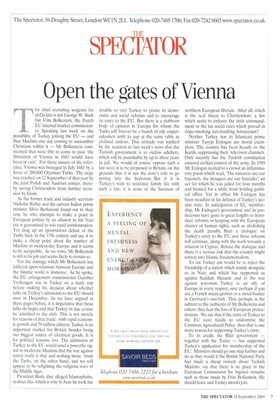Open the gates of Vienna
The chief recruiting sergeant for al-Qa'eda is not George W. Bush but Frits Bolkestein, the Dutch EU internal market commissioner. Speaking last week on the possibility of Turkey joining the EU — and thus Muslims one day coming to outnumber Christians within it — Mr Bolkestein commented that were this to come to pass 'the liberation of Vienna in 1683 would have been in vain'. For those unsure of the reference, Vienna was besieged in July 1683 by a force of 200,000 Ottoman Turks. The siege was crushed on 12 September of that year by the joint Polish and Austrian armies, thereby saving Christendom from further incursion by Islam.
As the former trade and industry secretary Nicholas Ridley and the current Italian prime minister Silvio Berlusconi found out to their cost, he who attempts to make a point in European politics by an allusion to the Nazi era is guaranteed to win rapid condemnation. Yet drag up an ignominious defeat of the Turks back in the 17th century and use it to make a cheap point about the number of Muslims in modern-day Europe and it seems to be acceptable. As we write, Mr Bolkestein is still in his job and seems likely to remain so.
Yet the damage which Mr Bolkestein has inflicted upon relations between Europe and the Islamic world is immense. As he spoke, the EU enlargement commissioner Gunther Verheugen was in Turkey on a study trip before making his decision about whether talks on Turkey's admission to the EU should start in December. As we have argued in these pages before, it is imperative that these talks do begin and that Turkey in due course be admitted to the club. This is not merely for reasons of free trade: with rapid economic growth and 70 million citizens. Turkey is an important market for Britain besides being our biggest source of electrical goods. It is for political reasons, too. The admission of Turkey to the EU would send a powerful signal to moderate Muslims that the war against terror really is that and nothing more. Snub the Turks, on the other hand, and we will appear to be refighting the religious wars of the Middle Ages.
President Bush, that alleged Islamophobe, realises this, which is why in June he took the trouble to visit Turkey to praise its democratic and social reforms and to encourage its entry to the EU. But there is a stubborn body of opinion in Europe for whom the Turks will forever be a bunch of oily carpetsalesmen unfit to sup at the same table as civilised nations. This attitude was typified by the reaction to last week's news that the Turkish government is to outlaw adultery, which will be punishable by up to three years in jail. We would of course oppose such a law were it to be proposed in Britain, on the grounds that it is not the state's role to go nosing into the bedroom. But if it is Turkey's wish to reinforce family life with such a law, it is none of the business of northern European liberals. After all, which is the real threat to Christendom: a law which seeks to enforce the sixth commandment or the lax social rules which prevail in dope-smoking, tart-fondling Amsterdam?
Neither Turkey nor its Islamicist prime minister Tayyip Erdogan are moral exemplars. The country has been beastly to the Kurds, suppressing their television channels. Only recently has the Turkish constitution ensured civilian control of the army. In 1999 Mr Erdogan recited to a crowd an inflammatory poem which read, 'The minarets are our bayonets, the mosques are our barracks'; an act for which he was jailed for four months and banned for a while from holding political office. Yet in office Mr Erdogan has been steadfast in his defence of Turkey's secular state. In anticipation of EU membership, Mr Erdogan's government and its predecessor have gone to great lengths to introduce reforms in keeping with the European charter of human rights, such as abolishing the death penalty. Start a dialogue on Turkey's entry to the EU and those reforms will continue, along with the work towards a solution in Cyprus. Refuse the dialogue and there is a serious risk that the country might retreat into Islamic fundamentalism.
To cut Turkey out would be to reject the friendship of a nation which stands alongside us in Nato and which has supported us against Saddam Hussein and in the war against terrorism. Turkey is an ally of Europe in every respect, save perhaps if you are a French maize-grower or a metal-basher in Germany's rust-belt. This, perhaps, is the subtext to the outbursts of Mr Bolkestein and others: they fear the loss of European protectionism. We say that if the entry of Turkey to the EU were fatally to undermine the Common Agricultural Policy, then that is one more reason for supporting Turkey's entry.
To its credit, the Blair government — together with the Tories — has supported Turkey's application for membership of the EU. Ministers should go one step further and do as they would if the British National Party had made a cheap remark about Turkish Muslims: say that there is no place in the European Commission for bigoted remarks such as those made by Frits Bolkestein. He should leave and Turkey should join.


















































































 Previous page
Previous page